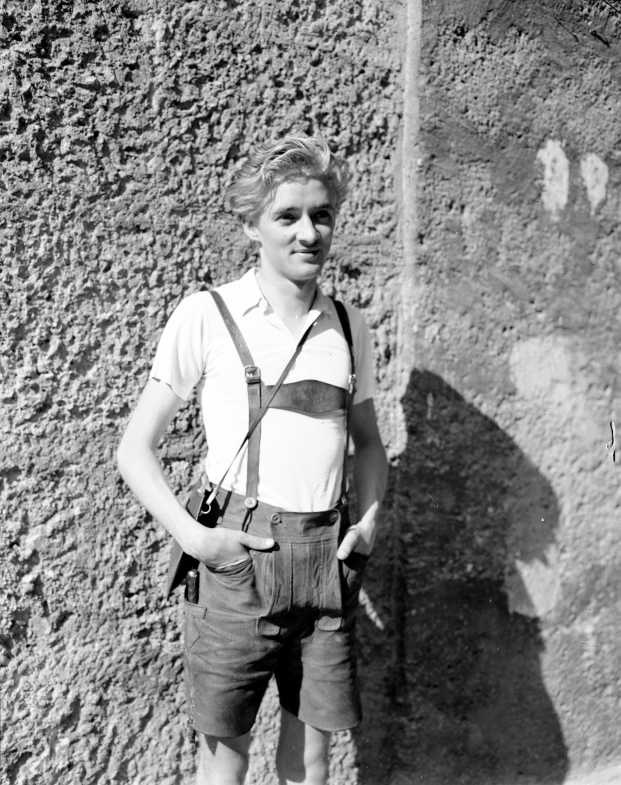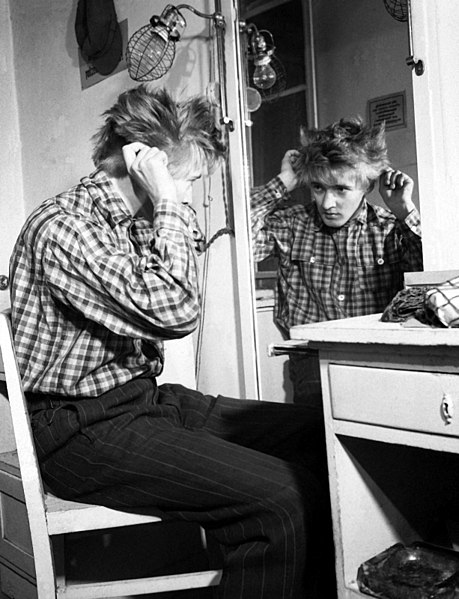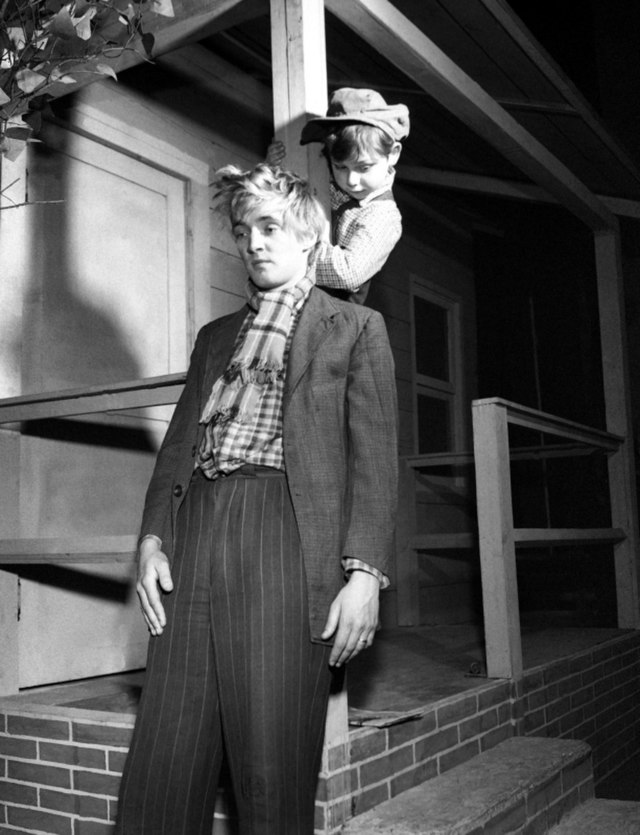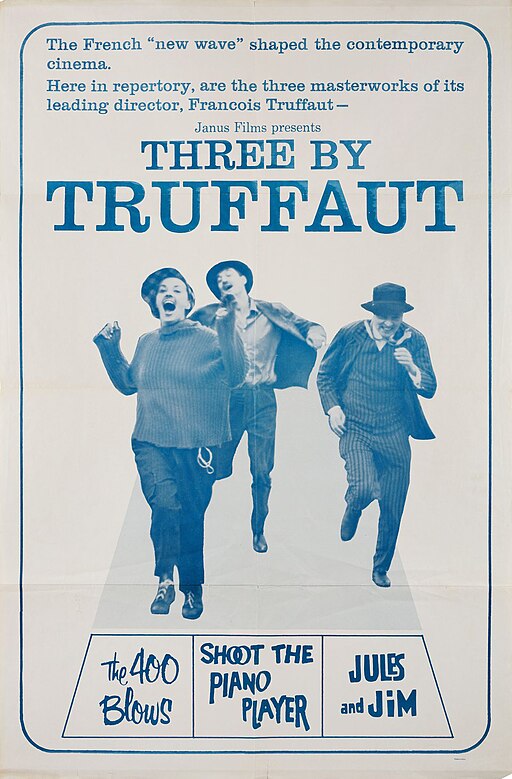Oskar Werner
back| Full Name | Oskar Josef Bschließmayer |
| Stage Name | Oskar Werner |
| Born | November 13, 1922 |
| Birthplace | Vienna, Austria |
| Died | October 23, 1984 |
| Buried | Triesen, Liechtenstein |
| Married to | Elisabeth Kallina (1944–1952) - Anne Power (1954–1968) |
| Children | Eleanore (with Elisabeth Kallina) |
| Notable films | Decision Before Dawn (1951) - Jules and Jim (1962) - Ship of Fools (1965) - The Spy Who Came in from the Cold (1965) - Fahrenheit 451 (1966) |
Oskar Werner
The Melancholic Visionary
Oskar Werner was a renowned actor known for his emotional depth and intellectual intensity. He began his career at the Burgtheater and gained international fame with "Decision Before Dawn" (1951).
Werner's most iconic roles include Jules in "Jules and Jim" (1962), Dr. Schumann in "Ship of Fools" (1965), and Guy Montag in "Fahrenheit 451" (1966). He won a Golden Globe and received an Academy Award nomination for "Ship of Fools."
Related
Oskar Werner (1922 – 1984)
Biography and Career Overview
Early Life
Oskar Werner, born Oskar Josef Bschließmayer on November 13, 1922, in Vienna, Austria, grew up in a modest household. His parents separated when he was young, and he was raised by his mother, who instilled in him a love for literature and the arts.
Career Beginnings
Werner showed an early interest in acting, performing in school plays and eventually enrolling at the Max Reinhardt Seminar in Vienna. He made his stage debut at the Burgtheater in 1941. During World War II, Werner was drafted into the German army but managed to desert in 1944, hiding in the Vienna Woods until the end of the war.
Rise to Fame
Werner's film career began in earnest after the war. He appeared in several Austrian and German films before gaining international attention with his role in "Decision Before Dawn" (1951), a Hollywood production. His performance in this film showcased his talent and opened doors to further opportunities.
International Success
Werner's portrayal of the melancholic, free-spirited writer Jules in François Truffaut's "Jules and Jim" (1962) remains one of his most iconic roles. The film was a critical and commercial success and established Werner as a significant presence in European cinema.
He continued to achieve international acclaim with his performances in "Ship of Fools" (1965) and "The Spy Who Came in from the Cold" (1965). Both films earned him accolades, with his role in "Ship of Fools" garnering a Golden Globe Award for Best Supporting Actor and an Academy Award nomination.
Iconic Role in "Fahrenheit 451"
In 1966, Werner starred in another François Truffaut film, "Fahrenheit 451," based on Ray Bradbury's dystopian novel. His portrayal of the conflicted fireman Montag was widely praised and remains one of his most memorable performances.
Personal Life
Werner was married twice. His first marriage to Elisabeth Kallina in 1944 produced a daughter, Eleanore. They divorced in 1952. In 1954, he married Anne Power, the daughter of American actor Tyrone Power and French actress Annabella. This marriage lasted until 1968.
Later Years and Death
In his later years, Werner struggled with personal and professional difficulties. Despite his immense talent, he became known for being difficult to work with, which limited his opportunities. He continued to work sporadically in film and television until his death.
Oskar Werner passed away on October 23, 1984, in Marburg an der Lahn, West Germany, from a heart attack. He was buried in Triesen, Liechtenstein.
Legacy
Oskar Werner left an indelible mark on both European and American cinema. His performances are remembered for their depth, sensitivity, and emotional intensity. He remains an iconic figure in the history of film, celebrated for his contributions to the art of acting.
Oskar Werner Treated Bad by Hollywood?
Analysis of Oskar Werner’s Acting Style:
Oskar Werner's acting style was distinguished by its deep emotional resonance, intellectual intensity, and distinctive mannerisms, making him one of the most memorable actors of his time.
Emotional Depth and Sensitivity
Werner had an exceptional ability to convey profound emotional states with subtlety and nuance. His performances often featured a melancholic undertone, reflecting an inner world of complex feelings and thoughts. He could express a wide range of emotions with a mere glance or slight change in facial expression, creating a powerful connection with the audience.
Intellectual Intensity
Werner brought a cerebral quality to his roles, often portraying characters who were thoughtful, introspective, and intellectually engaged. This was particularly evident in his performances in films like "Jules and Jim" and "Fahrenheit 451," where his characters grapple with philosophical and existential questions. His line delivery was precise and articulate, imbued with a sense of contemplation and inner conflict.
Distinctive Mannerisms
Werner’s acting was marked by distinctive physical mannerisms and vocal qualities. His somewhat languid, deliberate movements and expressive eyes added a unique layer to his character portrayals. His voice, often soft and slightly accented, conveyed both vulnerability and strength, enhancing the depth of his performances.
Understated Power
One of Werner’s trademarks was his understated approach to powerful emotions. He avoided overt displays of anger, joy, or sorrow, instead opting for a more restrained, controlled expression. This restraint made moments of emotional outburst even more impactful, as they contrasted sharply with his usual calm demeanor.
Versatility
Despite his distinctive style, Werner was versatile, capable of adapting to various genres and roles. Whether playing a disillusioned spy in "The Spy Who Came in from the Cold," a romantic writer in "Jules and Jim," or a conflicted fireman in "Fahrenheit 451," Werner brought authenticity and depth to each character. He could navigate seamlessly between different emotional and psychological states, making his characters believable and relatable.
Inner Conflict
Many of Werner’s most memorable roles involved characters experiencing inner turmoil and conflict. He had a gift for portraying the struggle between personal desires and moral or social constraints. This inner conflict was often reflected in his expressive eyes and thoughtful demeanor, drawing audiences into his characters' internal battles.
Influence of Theatre Training
Werner's background in theater was evident in his disciplined approach to acting. His performances were well-crafted and meticulously prepared, reflecting a strong foundation in theatrical techniques. This training gave him a commanding presence on screen, capable of holding the audience’s attention through subtle, yet powerful, performances.
Collaboration with Directors
Werner’s collaborations with renowned directors like François Truffaut brought out some of his finest work. He was known for his ability to understand and interpret the director's vision, adding layers of complexity to his roles. His performance in "Jules and Jim," for example, was enhanced by Truffaut’s innovative direction, creating a synergy that elevated the film to classic status.
Personal Charisma
Despite his often introverted characters, Werner possessed a magnetic screen presence. His charisma was not based on conventional good looks or charm, but on a compelling inner life that drew viewers in. This made him a unique and unforgettable actor, capable of leaving a lasting impression with each performance.
Memorable Quotes from Oskar Werner:
On Acting and Art:
"A good actor must have the love of a child, the craft of a painter, and the sense of responsibility of a diplomat."
On his Career:
"I have a good life, but my career was a disaster."
On Film and Cinema:
"Film is the art of the 20th century. It's the way we tell our stories and express our feelings. For me, it was a way to reach people and touch their hearts."
On his Role in "Fahrenheit 451":
"It was not only the story of a man who burns books but of a man who finds his soul in books."
On Life and Philosophy:
"Life is a beautiful thing, but it’s fleeting. We must live each moment with intensity and passion."
On His Relationship with François Truffaut:
"Working with Truffaut was like a dance. He understood my inner world and brought out the best in me."
On Personal Struggles:
"I have always been a restless spirit, searching for meaning and truth in a world that often seems devoid of both."
Awards and Recognition:
Academy Awards (Oscars)
Nomination:
- Best Actor in a Leading Role: "Ship of Fools" (1965)
Golden Globe Awards
Winner:
- Best Supporting Actor – Motion Picture: "Ship of Fools" (1965)
- Best Foreign Actor (Henrietta Award): (1966)
BAFTA Awards
Nomination:
- Best Foreign Actor: "The Spy Who Came in from the Cold" (1966)
National Board of Review, USA
Winner:
- Best Actor: "The Spy Who Came in from the Cold" (1965)
New York Film Critics Circle Awards
Winner:
- Best Actor: "Ship of Fools" (1965)
David di Donatello Awards (Italy)
Winner:
- Best Foreign Actor: "Ship of Fools" (1966)
German Film Awards (Deutscher Filmpreis)
Winner:
- Best Actor in a Leading Role: "The Last Ten Days" (1955)
Other Honors and Recognitions
- Vienna Film Award:
Winner: For contributions to Austrian cinema.
Movies featuring Oskar Werner:
1941: "Der Engel mit der Posaune" (The Angel with the Trumpet)
Synopsis: The story of a Viennese piano manufacturing family and their lives spanning from the late 19th century through World War II. Werner plays the young Hermann Alt, whose life is intertwined with the family saga.
1948: "Der Prozess" (The Trial)
- Synopsis: A dramatization of the true story of a Jewish man wrongfully accused of murder in a small Hungarian village. Werner plays a key role in highlighting the anti-Semitic tensions and injustices of the time.
1951: "Das Doppelherz" (The Double Heart)
Synopsis: A romantic drama involving complex relationships and personal dilemmas. Werner's character navigates through the emotional turmoil of love and betrayal.
1951: "Decision Before Dawn"
Synopsis: Werner stars as a German soldier who turns into a spy for the Allies during World War II. His mission is fraught with danger as he navigates through enemy lines, providing vital intelligence for the Allies.
1952: "Der Tag vor der Hochzeit" (The Day Before the Wedding)
Synopsis: A comedic tale that unfolds the day before a wedding, with misunderstandings and comedic mishaps leading to a heartwarming resolution.
1955: "Mozart"
Synopsis: A biographical film about the life of Wolfgang Amadeus Mozart. Werner portrays the legendary composer, showcasing his genius and the struggles he faced in his personal and professional life.
1956: "Spion für Deutschland" (Spy for Germany)
Synopsis: Set during World War II, this film follows a German spy's mission to steal the secrets of the Allied forces. Werner plays the lead role, depicting the complexities of espionage and loyalty.
1958: "Heldenplatz" (Heroes' Square)
Synopsis: A historical drama centered around the political and social upheavals in Vienna. Werner's character is caught in the midst of changing times, reflecting the conflicts and aspirations of the era.
1962: "Jules and Jim"
Synopsis: Directed by François Truffaut, this film is a classic of the French New Wave. Werner plays Jules, a shy Austrian writer, involved in a complex love triangle with his friend Jim and the enigmatic Catherine.
1965: "The Spy Who Came in from the Cold"
Synopsis: Based on John le Carré's novel, Werner stars as Fiedler, an East German intelligence officer, in this Cold War espionage thriller. The film explores themes of betrayal and moral ambiguity.
1965: "Ship of Fools"
Synopsis: Werner plays Dr. Schumann in this ensemble drama set aboard a ship bound for Germany in 1933. The film explores the diverse passengers' lives and relationships, reflecting broader social and political themes.
1966: "Fahrenheit 451"
Synopsis: Directed by François Truffaut, this adaptation of Ray Bradbury's novel features Werner as Guy Montag, a fireman in a dystopian future where books are banned and 'firemen' burn them. Montag's growing disillusionment leads him to rebel against the oppressive regime.
1968: "Interlude"
Synopsis: Werner stars as Dr. Stefan Zelter in this romantic drama about a married orchestra conductor who falls in love with a young journalist. The film delves into themes of love, fidelity, and the complexities of human relationships.
1970: "Das Geheimnis der falschen Braut" (The Secret of the False Bride)
Synopsis: This thriller follows a man who becomes entangled in a web of deceit and mystery when he investigates the background of his fiancée. Werner's character is central to unraveling the truth.
1976: "Voyage of the Damned"
Synopsis: Based on a true story, this film chronicles the tragic voyage of the SS St. Louis, which carried Jewish refugees fleeing Nazi Germany, only to be turned away from several countries. Werner plays a pivotal role as an official trying to aid the refugees.
1979: "Ein Mann will nach oben" (A Man Wants to Get to the Top)
Synopsis: A TV miniseries that follows the life of an ambitious man striving to improve his social standing in the early 20th century. Werner's performance highlights the personal and societal challenges of the era.
1981: "Jesus von Ottakring"
Synopsis: Werner stars in this film about a man who believes he is the second coming of Christ, set against the backdrop of a modern-day Viennese neighborhood. The film explores themes of faith, delusion, and redemption.
1984: "Quo Vadis?"
Synopsis: A television adaptation of Henryk Sienkiewicz's novel, Werner plays a significant role in this epic tale set in ancient Rome, exploring the conflict between the burgeoning Christian community and the Roman Empire.




